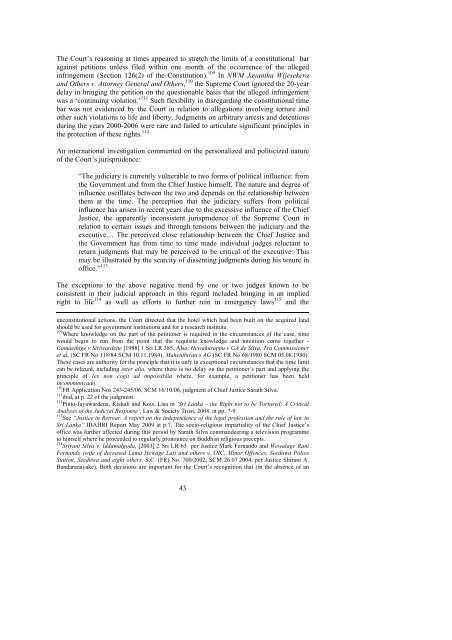Untitled - International Commission of Jurists
Untitled - International Commission of Jurists
Untitled - International Commission of Jurists
You also want an ePaper? Increase the reach of your titles
YUMPU automatically turns print PDFs into web optimized ePapers that Google loves.
The Court’s reasoning at times appeared to stretch the limits <strong>of</strong> a constitutional bar<br />
against petitions unless filed within one month <strong>of</strong> the occurrence <strong>of</strong> the alleged<br />
infringement (Section 126(2) <strong>of</strong> the Constitution). 109 In NWM Jayantha Wijesekera<br />
and Others v. Attorney General and Others, 110 the Supreme Court ignored the 20-year<br />
delay in bringing the petition on the questionable basis that the alleged infringement<br />
was a ‘continuing violation.’ 111 Such flexibility in disregarding the constitutional time<br />
bar was not evidenced by the Court in relation to allegations involving torture and<br />
other such violations to life and liberty. Judgments on arbitrary arrests and detentions<br />
during the years 2000-2006 were rare and failed to articulate significant principles in<br />
the protection <strong>of</strong> these rights. 112<br />
An international investigation commented on the personalized and politicized nature<br />
<strong>of</strong> the Court’s jurisprudence:<br />
“The judiciary is currently vulnerable to two forms <strong>of</strong> political influence: from<br />
the Government and from the Chief Justice himself. The nature and degree <strong>of</strong><br />
influence oscillates between the two and depends on the relationship between<br />
them at the time. The perception that the judiciary suffers from political<br />
influence has arisen in recent years due to the excessive influence <strong>of</strong> the Chief<br />
Justice, the apparently inconsistent jurisprudence <strong>of</strong> the Supreme Court in<br />
relation to certain issues and through tensions between the judiciary and the<br />
executive… The perceived close relationship between the Chief Justice and<br />
the Government has from time to time made individual judges reluctant to<br />
return judgments that may be perceived to be critical <strong>of</strong> the executive. This<br />
may be illustrated by the scarcity <strong>of</strong> dissenting judgments during his tenure in<br />
<strong>of</strong>fice.” 113<br />
The exceptions to the above negative trend by one or two judges known to be<br />
consistent in their judicial approach in this regard included bringing in an implied<br />
right to life 114 as well as efforts to further rein in emergency laws 115 and the<br />
unconstitutional actions, the Court directed that the hotel which had been built on the acquired land<br />
should be used for government institutions and for a research institute.<br />
109 Where knowledge on the part <strong>of</strong> the petitioner is required in the circumstances <strong>of</strong> the case, time<br />
would begin to run from the point that the requisite knowledge and intention come together -<br />
Gamaethige v Siriwardene [1988] 1 Sri LR 385. Also, Hewakuruppu v GA de Silva, Tea <strong>Commission</strong>er<br />
et al, (SC FR No 118/84 SCM 10.11.1984), Mahenthiran s AG (SC FR No 68/1980 SCM 05.08.1980).<br />
These cases are authority for the principle that it is only in exceptional circumstances that the time limit<br />
can be relaxed, including inter alia, where there is no delay on the petitioner’s part and applying the<br />
principle <strong>of</strong> lex non cogit ad impossiblia where, for example, a petitioner has been held<br />
incommunicado.<br />
110 FR Application Nos 243-245/06, SCM 16/10/06, judgment <strong>of</strong> Chief Justice Sarath Silva.<br />
111 ibid, at p. 22 <strong>of</strong> the judgment.<br />
112 Pinto-Jayawardena, Kishali and Kois, Lisa in ‘Sri Lanka – the Right not to be Tortured; A Critical<br />
Analysis <strong>of</strong> the Judicial Response’, Law & Society Trust, 2008, at pp. 7-9.<br />
113 See “Justice in Retreat: A report on the independence <strong>of</strong> the legal pr<strong>of</strong>ession and the rule <strong>of</strong> law in<br />
Sri Lanka” IBAHRI Report May 2009 at p.7. The socio-religious impartiality <strong>of</strong> the Chief Justice’s<br />
<strong>of</strong>fice was further affected during this period by Sarath Silva commandeering a television programme<br />
to himself where he proceeded to regularly pronounce on Buddhist religious precepts.<br />
114 Sriyani Silva v. Iddamalgoda, [2003] 2 Sri LR 63 per Justice Mark Fernando and Wewalage Rani<br />
Fernando (wife <strong>of</strong> deceased Lama Hewage Lal) and others v. OIC, Minor Offences, Seeduwa Police<br />
Station, Seeduwa and eight others, S.C. (FR) No. 700/2002, SCM 26.07.2004, per Justice Shirani A.<br />
Bandaranayake). Both decisions are important for the Court’s recognition that (in the absence <strong>of</strong> an<br />
43
















